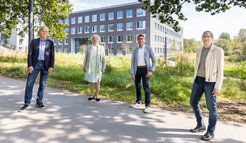30 years of cutting-edge collaboration and microbial research
The Max Planck Institute in Marburg celebrates its 30th anniversary and the long-standing cooperation with the Philipps-Universität Marburg
In 1991, The Max Planck Institute (MPI) for Terrestrial Microbiology was founded on the initiative of the microbiologist Prof. Dr. Rudolf K. Thauer. Today, Marburg is one of the world's attractive locations for research in microbiology. This is also the result of a very successful and continuous partnership with the Philipps-Universität Marburg (UMR).

Research at the MPI for Terrestrial Microbiology focuses on microorganisms, the most widespread life form on earth. Microorganisms are not only ubiquitous and thus shape the life of every single human being, they are also the key to answers to our pressing questions today: nutrition, health and global climate. As research objects, microorganisms are the focus of a worldwide scientific community, in which Marburg plays an important role.
"The cross-disciplinary collaboration between working groups at the Max Planck Institute and Philipps University has led to research results that have been groundbreaking for the respective discipline of the life sciences. These results are the result of very good cooperation, supported also by state-of-the-art equipment available to the working groups of both institutions," says the President of Philipps-Universität Marburg, Prof. Dr. Katharina Krause.
Numerous young scientists from all over the world are attracted to Marburg - like 33-year-old Max Planck Research Group Leader Georg Hochberg, who joined the MPI after studying at Oxford and earning his doctorate in Chicago. "I was attracted to Marburg by the very exciting biochemistry happening here, which has taken my research in totally new directions. Marburg also has a great and cohesive cohort of young groups working together and looking out for each other," the scientist says.
In addition, the numerous collaborations are a fruitful basis for the promotion of young scientists. The International Max Planck Research School (IMPRS-Mic) program offers interdisciplinary training and mentoring by assigned mentors from MPI and the university. Research projects can be conducted in MPI laboratories, at the Center for Synthetic Microbiology (SYNMIKRO), or at the university. The doctoral degree is awarded by the UMR.
An important link between the MPI and the university is the SYNMIKRO Center, which was established in 2010 at the instigation of Max Planck Directors Prof. Dr. Lotte Søgaard-Andersen and Prof. Dr. Regine Kahmann and University Professors Roland Lill and Bruno Eckhardt, with the support of then Vice President Prof. Dr. Katharina Krause. Since then, it has developed into one of the world's largest centers of synthetic microbiology research. From 2019, the former LOEWE center is operated on a permanent basis by Philipps University together with the MPI. The research groups are currently moving into the new SYNMIKRO building, one of the largest new research buildings in Hesse and classified as particularly eligible for funding by the German Science Council. "The SYNMIKRO center with its new research building, which hosts working groups of the UMR and the Max Planck Institute under one roof, is a model for successful cooperation between a university and a non-university research institution that is quite unique in Germany. Through SYNMIKRO, microbiological research in Marburg has been enriched by the emerging field of synthetic biology, aiming to quantitatively understand the dynamic interactions of the components of microbiological systems and to engineer synthetic systems for basic research and application," says Prof. Dr. Anke Becker, managing director of SYNMIKRO.
Currently, another novel cooperation format between the MPI for Terrestrial Microbiology and the university is being established. The project "Future Center Microcosm Earth" with the support of the state of Hesse is intended to offer outstanding young talents in the field of microbiology the opportunity to develop new topics and to establish their own field of research. "The multi-year project is intended to secure Marburg's successful development into a center of cutting-edge microbiological research and to attract a coming generation of excellent scientists," explains Prof. Dr. Tobias Erb, Managing Director of the Max Planck Institute and co-initiator of the project, and continues: "the framework of the new Future Center is a unique opportunity to jointly lead the successful collaboration with the university, which began with Rolf Thauer, into a new future. Together, we want to understand how microorganisms are in balance with their environment in order to develop new ways for a more sustainable and healthier world of tomorrow, true to Max Planck's motto: Insight must precede application."
Background information: The Max Planck Institute for Terrestrial Microbiology was founded in 1991; the founding director was Dr. Rudolf K. Thauer, Professor of Microbiology at the Philipps-Universität Marburg. The first two departments were established in 1991; these were the Department of "Biochemistry" (headed by Rudolf K. Thauer) and the Department of "Biogeochemistry", headed by Ralf Conrad. Today, research at the Institute is carried out in four departments. The four departments' directors, Helge Bode ("Natural Products in Organismic Interactions"), Lotte Søgaard-Andersen ("Ecophysiology"), Victor Sourjik ("Systems and Synthetic Microbiology") and Tobias Erb ("Biochemistry and Synthetic Metabolism") are scientific members of the Max Planck Society. In addition, the institute hosts three Max Planck Research Groups, two Emmy Noether Research Groups, four department-independent research groups, three Emeriti and two Max Planck Fellows. The executive director from 2021 to 2023 is Tobias Erb.












